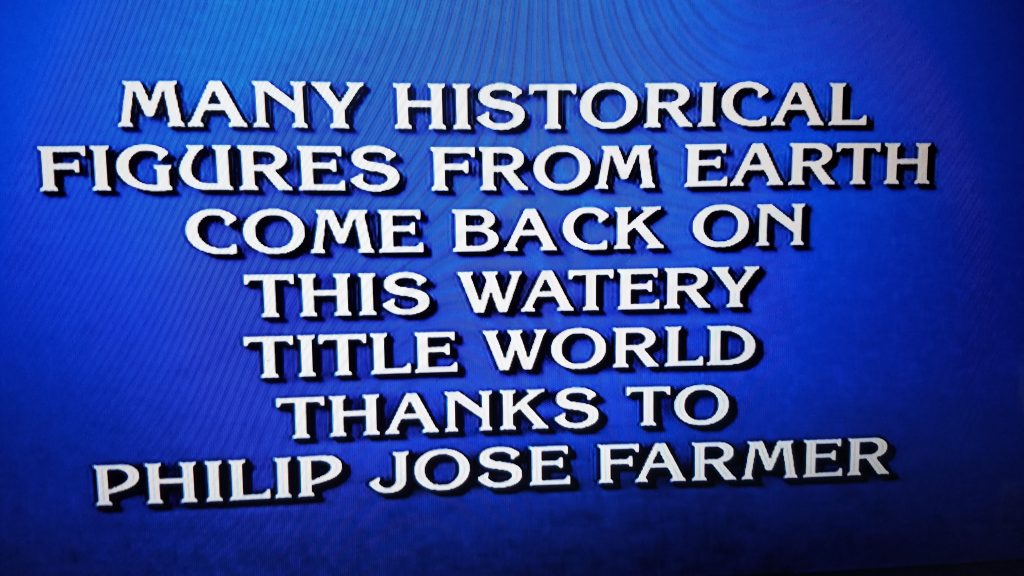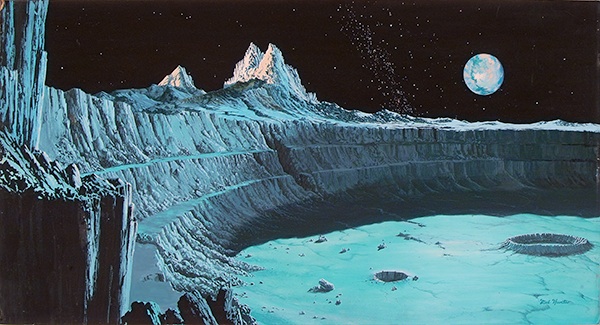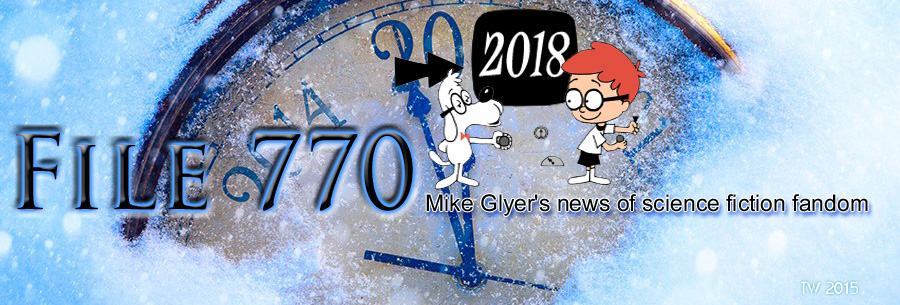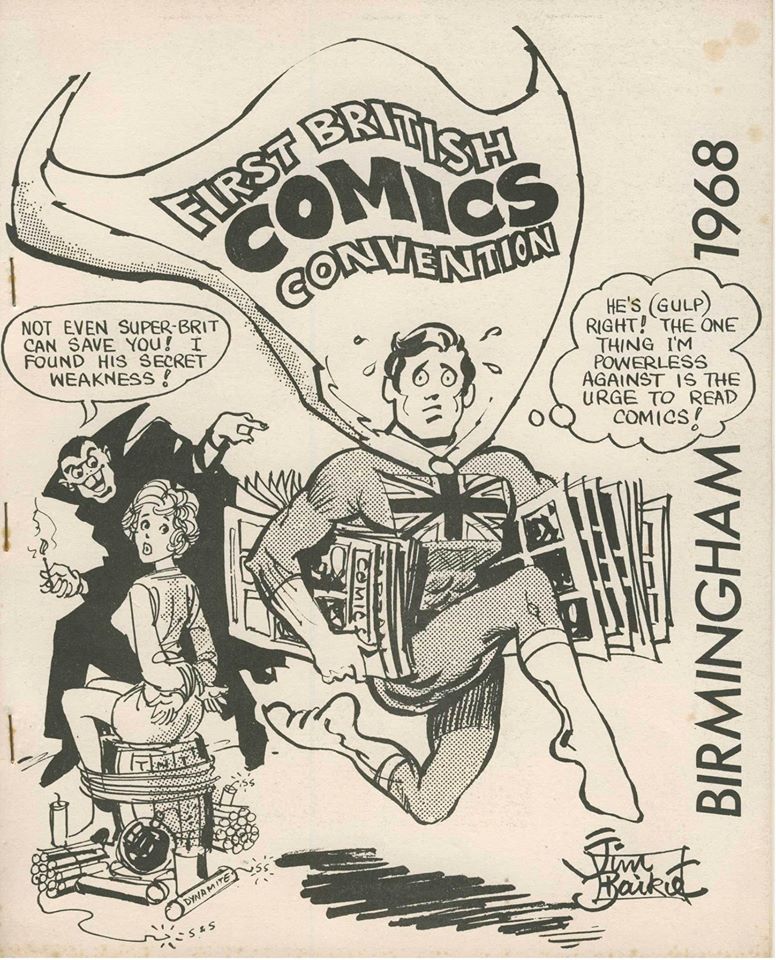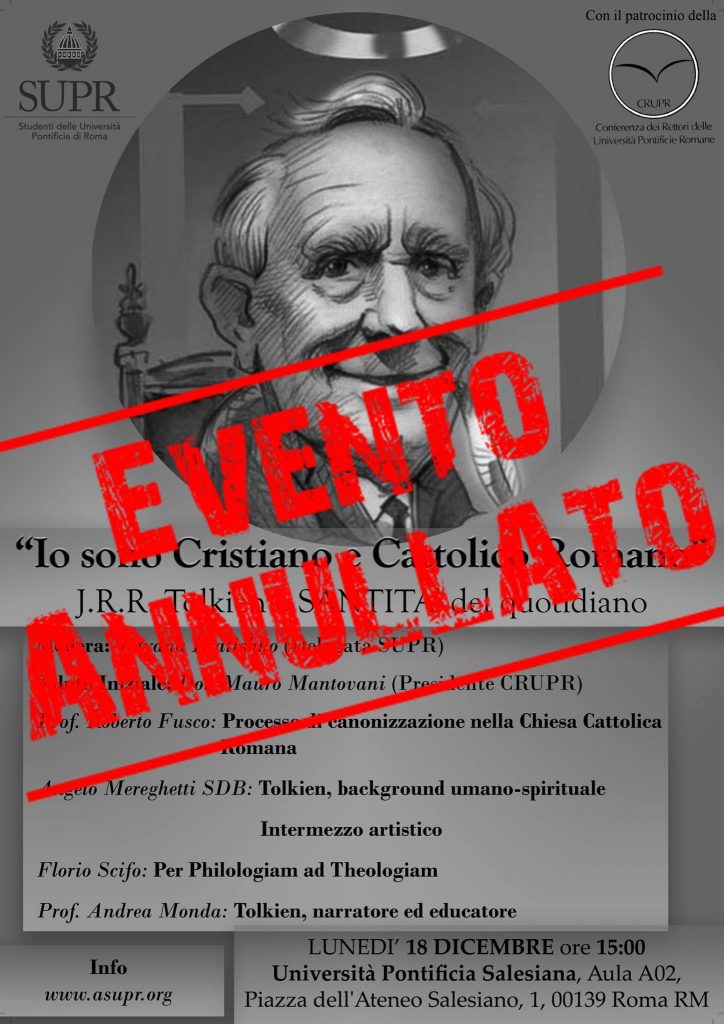(1) AMERICA’S FAVORITE DOCTOR. Welby? Casey? Kildare? Guess Who….? Thursday on BBC America:
Have TARDIS, will time travel: The new special “Doctor Who: The Lost Episode” uses remastered footage and new animation to reconstruct an unfinished 1970s-era tale from the venerable British science fiction drama penned by “Hitchhiker’s Guide to the Galaxy” author Douglas Adams and starring Tom Baker as the Fourth Doctor. 8 p.m. BBC America
(2) DEAL ALL THE CARDS. The Doctor figures in “The Pigs in Space” sketch at The Muppets Take the O2 (Arena) show, too.
THE MUPPETS AS EVERY DOCTOR pic.twitter.com/LQJewTaLf5
— cara compass (@caracompass) July 14, 2018
(3) TASTE TEST. Cat Rambo turns in another sweet critique to The Green Man Review: “The Prettiest Candy: Albanese World’s Best Mini Gummi Butterflies”.
Having recently discovered that my favorite gummi bears were possibly made with child labor, I went looking for a substitute recently and picked up a bag of Albanese Mini Gummi Butterflies.
Candy is often not pretty, particularly when chocolate is involved, but these candies, shaped like butterflies, look like little stained glass jewels. The flavors are blue raspberry, cherry, grape, green apple, orange, and strawberry, with the usual scheme of color vaguely indicating flavor….
(4) SHADOW CLARKE JURY DELIBERATIONS. Fell a little behind linking to these posts…..
- Alasdair Stuart — “Alasdair Stuart Reviews Water & Glass”
…I went a bit overboard (OH GOD HELP I CAN’T STOP) but you get the point. There’s a completely functional and immensely fun version of this story that puts it solidly in the Hunger Games/Limetown bracket of ‘tough heroic female lead discovers something terrible and vows to defeat it.’ I love stories like those, especially when they’re folded into this kind of post-apocalyptic subset of fiction.
But what Curtis does here is untidier, harder to achieve, newer and ultimately more rewarding. Nerissa is living day to day after losing everything, so she isn’t party to what would be the central plot in a more traditional dystopia. The parts she discovers, especially the transhumanism elements of the final act, feel earned and contextualized precisely because she discovers them when she does….
- Nick Hubble — “Stuff Your Face: Hubble on Luna”
As I said when making my selection of books to review for the Shadow Clarke, I didn’t expect to see Ian McDonald’s Luna: Wolf Moon on the shortlist. Having read it, I don’t have any direct criticism of the Clarke jury for neglecting it but that is not to say that I didn’t enjoy the novel. In fact, I enjoyed it very much and also its predecessor, Luna: New Moon, which I read immediately beforehand. That, of course, is one of the problems with considering a sequel or volume from a series for an award; it is going to be difficult to judge it without knowledge of the preceding story. Especially, when, as in this case, we are dealing with the middle volume in a trilogy which directly picks up strands from the first volume and also does recognisable work in setting up its successor. Therefore, despite the fact that Luna: Wolf Moon contains a strong narrative arc of its own and leaves the reader feeling as satisfied as if they have read a standalone novel, it is nonetheless not directly comparable because it is not entirely self-contained. Experience suggests that judges are generally inclined to favour the single-volume work (and on a practical level they are probably unwilling to read earlier series volumes on top of lengthy submission lists).
- Foz Meadows — “Foz Meadows Reviews The Collapsing Empire”
To kick off my Shadow Clarke experience, I’ve started with John Scalzi’s The Collapsing Empire, a novel based on a singularly intriguing premise. In a far distant future, humanity exists in an interplanetary empire called the Interdependency, its far-flung outposts connected by the Flow: a series of natural space-time currents that facilitate fast travel between different parts of the universe. As the Flow exists without concern for human planetary preferences – and as the Flow route to Earth was lost centuries ago – the majority of people live underground, in planetary habitats or in space stations along these Flow routes, with trade and travel controlled by aristocratic Guild families. Only one habitable world exists: the planet of End, so-called because it’s the most distant realm in the Interdependency, accessible only by a single pair of Flow streams connecting it to Hub, where the Emperox rules. But the Flow, so long assumed stable, is collapsing, threatening the survival of the entire Interdependency – and, as a consequence, of the human race….
- Samira Nadkarni — “Samira Nadkarni Reviews Water & Glass”
…When I originally added Water & Glass to my short list, I suspected that the plot’s concern with a group of (largely European-coded) survivors onboard a submarine, the Baleen, would herald “an already present anxiety about intimacy, trauma, and reproductive concerns.” Given its thematic concerns from the blurb, I guessed that as a Noah’s Ark tale, the plot would likely revolve around questions of “precariousness and interdependent survival, resettling, and the possibility or repopulation or extinction,” though within the frameworks of the novel itself they were unable to gather more than a few animals, rather than any idea of two of a wide variety. Since reproduction felt central to Water & Glass’ concerns, the blurb itself led me to worry about the likelihood of queerphobia or eugenics in play, and unfortunately this assumption is almost entirely borne out. While queerness is entirely and frustratingly absented from this narrative (its own form of queerphobia), a concern with eugenics and human evolution through human-animal gene splicing is one of the grand revelations of the piece….
Dreams Before the Start of Time is beautifully written. The prose is clear, sometimes sparse, quite subtle in the way it provides a smooth emotional surface whilst signalling a great depth of feeling within the many characters. It is also an excellent science fiction novel-of-ideas, with clear themes and careful working out of the societal implications of new technology. How wonderful! …
- Gary K. Wolfe, Nick Hubble, Alasdair Stuart — “Panel Review: American War by Omar El Akkad”
American War has been short-listed for the 2018 Arthur C. Clarke award. A selection of our panel of shadow jurors respond to the novel below…
- Gary K. Wolfe, Nick Hubble, Alasdair Stuart, Samira Nadkarni — “Panel Review: Spaceman of Bohemia by Jaroslav Kalfar”
Rich with warmth and suspense and surprise, Spaceman of Bohemia is an exuberant delight from start to finish. Very seldom has a novel this profound taken readers on a journey of such boundless entertainment and sheer fun. It has been short-listed for the 2018 Arthur C. Clarke award. A selection of our panel of shadow jurors respond to the novel below…
- Gary K. Wolfe, Alasdair Stuart, Nick Hubble, Foz Meadows — “Panel Review: Sea of Rust by C. Robert Cargill”
HUMANKIND IS EXTINCT.
Wiped out in a global uprising by the very machines made to serve them. Now the world is controlled by OWIs — vast mainframes that have assimilated the minds of millions of robots.
But not all robots are willing to cede their individuality, and Brittle is one of the holdouts.
- Foz Meadows — “In Defense of Putting Down a Book”
Left to my own devices, it’s rare for me to write criticism for books I haven’t finished. If I find a book boring or if it simply isn’t for me, there’s little motive to write a partial review to that effect, and so I don’t say anything; alternatively, if a work annoys me so much that I want to nitpick it in detail, I usually spite-read the entirety to be sure my facts are in order. In this instance, however, I feel justified in submitting criticism based on partial reads for two main reasons. Firstly, the Shadow Clarke jury is, by design and definition, reactive: we are here to pass judgement on award selections that have already been made by other people, and to do so in only 300-500 words per book. That being so, while we’ve certainly been given the scope and opportunity to write longer, more in-depth criticisms if we want, at base, we’ve been asked to provide a pass/fail grade on whether we feel a particular book merited its inclusion on the shortlist, with only a cursory explanation as to why.
Which leads to the second point: we are doing this on a fairly tight schedule which – for me, personally – overlaps with packing up my house and family in preparation for an international move. Work on the Shadow Clarke is unpaid, done as a labour of love for the genre; and while I’m happy to participate on those conditions, I am not a masochist….
- Alasdair Stuart — “Alasdair Stuart Reviews American War”
Reading American War directly after Borne is an interesting experience, if not exactly a cheerful one. Where Vandermeer’s novel carefully files the comfort of specific geography off every element of it’s world, El Akkad builds his dystopian America in painful familiarity. North and South, Blue and Red. CNN and Fox. The political and ideological dividing lines that it’s impossible to avoid in the hourly news cycle are the frame work for El Akkad’s novel. Or at the very least, the foundation.
- Gary K. Wolfe, Nick Hubble, Alasdair Stuart, Samira Nadkarni, Foz Meadows — “Panel Review: Dreams Before the Start of Time by Anne Charnock”
In a near-future London, Millie Dack places her hand on her belly to feel her baby kick, resolute in her decision to be a single parent. Across town, her closest friend—a hungover Toni Munroe—steps into the shower and places her hand on a medic console. The diagnosis is devastating.
In this stunning, bittersweet family saga, Millie and Toni experience the aftershocks of human progress as their children and grandchildren embrace new ways of making babies. When infertility is a thing of the past, a man can create a child without a woman, a woman can create a child without a man, and artificial wombs eliminate the struggles of pregnancy. But what does it mean to be a parent? A child? A family?
Through a series of interconnected vignettes that spans five generations and three continents, this emotionally taut story explores the anxieties that arise when the science of fertility claims to deliver all the answers.
It has been short-listed for the 2018 Arthur C. Clarke award. A selection of our panel of shadow jurors respond to the novel below…
- Alasdair Stuart — “Alasdair Stuart Reviews Sea of Rust”
…Cargill is a screenwriter first and foremost and its impossible not to see the influence of his primary craft here. That’s not a criticism either, there’s no sense of this being a lightly expanded movie treatment designed to be dropped onto a producer’s desk as an unusually fancy leave behind. Rather, this is a book steeped in the iconography and tempo of modern American cinema and that’s both interesting and not always a good thing for book or reader….
- Gary K. Wolfe, Nick Hubble, Alasdair Stuart — “Panel Review: Gather the Daughters by Jennie Melamed”
On a small isolated island, there’s a community that lives by its own rules. Boys grow up knowing they will one day take charge, while girls know they will be married and pregnant within moments of hitting womanhood.
But before that time comes, a ritual offers children an exhilarating reprieve. Every summer they are turned out onto their doorsteps, to roam the island, sleep on the beach and build camps in trees. To be free.
At the end of one of such summer, one of the younger girls sees something she was never supposed to see. And she returns home with a truth that could bring their island world to its knees.
It has been short-listed for the 2018 Arthur C. Clarke award. A selection of our panel of shadow jurors respond to the novel below…
…The greatest problem for me with Gather the Daughters is that no one is allowed to behave or think or speak like an adult. (We have only to think of the depth of field achieved by Margaret Atwood in her characterisation of The Handmaid’s Tale to see how Melamed’s novel is deficient in this regard.) A narrative that depends on compliance will inevitably run out of steam, as this one does. History has proved to us time and again that holding down a dictatorship is difficult work – sooner rather than later the peasants begin to uncover the injustices and deceptions perpetrated against them, and start to revolt. You have to kill a lot of people to keep these systems going, and even so your days as a despot are numbered from the beginning. On the island, the only reason nothing has come unstuck for the Wanderers so far is because everyone else in the community insists on behaving like characters in a YA dystopia….
- Gary K. Wolfe, Nick Hubble, Alasdair Stuart, Foz Meadows — “Panel Review: Borne by Jeff VanderMeer”
It has been short-listed for the 2018 Arthur C. Clarke award. A selection of our panel of shadow jurors respond to the novel below…
- Nina Allan — “Wild at Heart: Borne by Jeff VanderMeer”
What is it I look for in science fiction? The answer will be different for everyone, of course, and some who followed last year’s Shadow Clarke project may have come away with the impression that I don’t really like science fiction at all, that I’ll always find something to gripe about because that’s the kind of critic I am.
The truth is that I want books to be brilliant, and that’s what I go in hoping, every time. Most of all I hope to be shocked and surprised by a new voice or a new idea or a new way with words, to be seduced by science fiction all over again. Although Jeff VanderMeer can scarcely be described as a new voice, the effect of reading Borne has been transfiguring, like water after drought. After a long dry spell in which I honestly thought I’d had it with the genre, encountering Borne has left me on a high, inspired to join in the conversation once again.
(5) EXERCISE YOUR FRANCHISE. One of File 770’s self-imposed duties is to chronicle the many genre awards. Few are as exotic as Chuck Wendig’s — “Awkward Author Contest 2018: Winner, And Now It’s Your Turn”. He has picked JD Buffington as the first winner, and called on his blog readers to vote on the other entries.
Here are the rest — there are 40 more submissions.
They are utterly weird and wonderful. You will find some familiar faces in here, perhaps.
Your job now is:
Pick your favorite.
Just one.
JUST ONE.
Go to the comments section below.
Type in the number of your favorite photo — the number that corresponds with the photo in Flickr. Aka, the photo’s title.
That’s it.
Type nothing else, or your vote may not be counted.
Do not choose two.
Choose one, type only the number.
We’ll keep voting open till Wednesday, July 25th.
Enjoy. Vote. See you on the other side.
(6) COMICS SECTION.
- A bad pun produced by a great mashup of comic and movie references in Brevity.
(7) BOOK RECOMMENDATIONS. Business Insider lists “15 books famous scientists think you should read”.
We compiled a list of book recommendations from a handful of illustrious minds by combing the web for quotes, checking out personal blogs, and just asking them directly. The picks below come from popular scientists including author and television personality Bill Nye, surgeon-turned-writer Siddhartha Mukherjee, and globe-trotting primatologist Jane Goodall.
The books they’ve recommended range from high fantasy, like Tolkien’s “The Lord of the Rings,” to canonical, like Plato’s seminal work “The Republic.”
Here are 15 books that brilliant scientists consider must-reads…
(8) AIR CAB. No discussion of what fares will be: “Rolls Royce develops propulsion system for flying taxi”.
Rolls said the initial concept for EVTOL used gas turbine technology to generate electricity to power six electric propulsors, specially designed to have a low noise profile.
Its wings would be able to rotate 90 degrees, enabling the vehicle to take off or land vertically. It could also use existing heliports and airports.
“We believe that given the work we are doing today to develop hybrid electric propulsion capabilities, this model could be available by the early to mid 2020s, provided that a viable commercial model for its introduction can be created,” the firm said.
(9) PROJECT LAUNCHED. The BBC reports — “Lift-off for Scotland: Sutherland to host first UK spaceport”.
Lockheed has made no secret of its desire to bring the Electron rocket to Scotland. Currently, this vehicle flies out of New Zealand.
A British version of the rocket would have an upper-stage developed and built at LM’s UK HQ in Ampthill, Bedfordshire.
“This is a defining moment for UK Space,” a spokesperson for the company told BBC News. “Lockheed Martin has been working with Britain for over 80 years and we stand ready to support the development of UK launch capability should our extensive experience in developing space infrastructure be called upon.”
(10) INFLUENTIAL ANIME. In the Washington Post, Hau Chu looks at the 30th anniversary of Akira (first released in Japan on July 15, 1988) and sees it as “inspiring a generation of works to come”, including “Stranger Things,” a Kanye West music video, and Rian Johnson’s Looper: “Why the pioneering Japanese anime ‘Akira’ is still relevant 30 years later”.
For the film’s cyberpunk look, Otomo drew from his own pop culture obsessions, including “Blade Runner,” which influenced the towering skyscrapers of Neo Tokyo, and “Tron,” whose neon-illuminated motorcycles inspired the hordes of biker gangs.
Otomo had been a respected illustrator of manga, Japanese comics. But for “Akira,” instead of trying to match his anime peers in Japan, he was working from European comic artists such as Moebius — an influential artist for the legendary Japanese animator Hayao Miyazaki. Otomo’s drawings for “Akira” were distinctive for their realism; he used lighting, color and an attention to detail to create a vivid, lived-in space.
(11) DRAGONS FOREVER. In August, the USPS will issue a set of stamps featuring dragons: “Postal Service to Feature Mythological Creatures on Stamps at APS National Summer Convention Stamp Show”.
The U.S. Postal Service will be joined by the American Philatelic Society (APS) to unveil four colorful stamp designs of 16 Forever stamps depicting dragons — the high-flying, fire-breathing mythological creatures that have roamed our imaginations for millennia — at the APS national summer convention and stamp show Aug. 9-12 in Columbus, OH.
“We’re very excited to bring these beautiful stamps to the 132nd annual APS convention,” said U.S. Postal Service Stamp Services Director Mary-Anne Penner. “This is one of the premier stamp shows in America and serves as an excellent platform to showcase these special stamps.”
…The new stamps will be issued as a pane of 16 stamps showcasing one of four designs: a green fire-breathing dragon towering over a medieval-inspired castle; a purple dragon with orange wings and sharp black armor on its back snaking around a white castle; a black dragon with green wings and green armor on its back swooping past a ship on the sea; and a wingless orange dragon weaving its way around a pagoda.
The stamps feature digital illustrations created by artist Don Clark of Invisible Creature studio.
(12) TRAILER PARK. 7 Splinters in Time — now in theaters.
Directed by: Gabriel Judet-Weinshel Detective Darius Lefaux is called to identify a body that is identical to him. As he dives into the harrowing case, different versions of himself begin to emerge and haunting memories of lives not lived fill his mind. Darius soon realizes that not all versions of himself are good and that he must find his other self, before it finds him.
[Thanks to John King Tarpinian, Cat Eldridge, Chip Hitchcock, JJ, Martin Morse Wooster, Mike Kennedy, Carl Slaughter, and Andrew Porter for some of these stories. Title credit goes to File 770 contributing editor of the day Kip W.]


